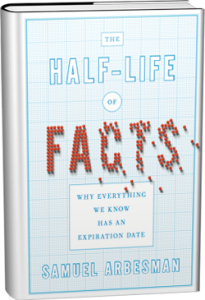Information (overload) this is the fastest growing phenomenon on this planet. Information is superabundant. According to The Economist the amount of digital information increases tenfold every five years. But another source (EMC2 – responsible for the World Information Growth Ticker above) says that, “The world’s information is doubling every two years. In 2011 the world will create a staggering 1.8 zettabytes. By 2020 the world will generate 50 times the amount of information.” In another study “How much information?” researchers Hal Varian and Peter Lyman measured the total production of all information channels in the world for two different years, 2000 and 2003. Varian and Lyman estimate that the total production of new information in 2000 reached 1.5 exabytes. They explain that is about 37,000 times as much information as is in the entire holdings Library of Congress. For one year! Three years later the annual total yielded 3.5 exabytes. That yields a 66% rate of growth in information per year. So, nobody knows exactly how much information there is and how fast it’s growing but we know for sure that there is far too much information that we can process.
And information changes and goes out of date all the time (as suggested by this book ‘The Half-Life of Facts: Why Everything We Know Has an Expiration Date‘ by Samuel Arbesman. Smoking has gone from doctor-recommended to deadly. We used to think the Earth was the center of the universe and that Pluto was a planet. For decades, we were convinced that the Brontosaurus was a real dinosaur. Eating meat used to be good for you, then bad, then good again – now it’s a matter of opinion. I have no idea any longer whether or not red wine is good for me. In short, what we know about the world is constantly changing. Information overload = information unload. Much of what we believe to be factual has an expiration date, but the good news is that we can see it coming (according to NewScientist).
That’s why speed reading can help you to keep up to date with information in your field.

